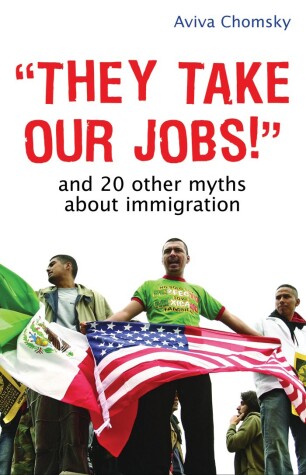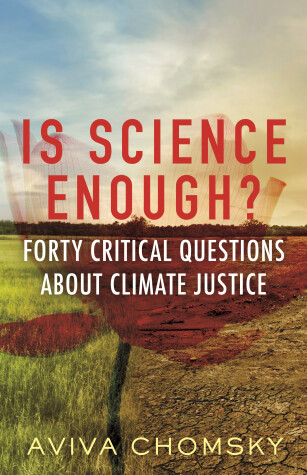Myths Made in America
2 total works
Claims that immigrants take Americans' jobs, are a drain on the American economy, contribute to poverty and inequality, destroy the social fabric, challenge American identity, and contribute to a host of social ills by their very existence are openly discussed and debated at all levels of society. Chomsky dismantles twenty of the most common assumptions and beliefs underlying statements like "I'm not against immigration, only illegal immigration" and challenges the misinformation in clear, straightforward prose.
In exposing the myths that underlie today's debate, Chomsky illustrates how the parameters and presumptions of the debate distort how we think—and have been thinking—about immigration. She observes that race, ethnicity, and gender were historically used as reasons to exclude portions of the population from access to rights. Today, Chomsky argues, the dividing line is citizenship. Although resentment against immigrants and attempts to further marginalize them are still apparent today, the notion that non-citizens, too, are created equal is virtually absent from the public sphere. Engaging and fresh, this book will challenge common assumptions about immigrants, immigration, and U.S. history.
In exposing the myths that underlie today's debate, Chomsky illustrates how the parameters and presumptions of the debate distort how we think—and have been thinking—about immigration. She observes that race, ethnicity, and gender were historically used as reasons to exclude portions of the population from access to rights. Today, Chomsky argues, the dividing line is citizenship. Although resentment against immigrants and attempts to further marginalize them are still apparent today, the notion that non-citizens, too, are created equal is virtually absent from the public sphere. Engaging and fresh, this book will challenge common assumptions about immigrants, immigration, and U.S. history.
Why social, racial, and economic justice are just as crucial as science in determining how humans can reverse climate catastrophe
We are facing a climate catastrophe. A plethora of studies describe the damage we’ve already done, the droughts, the wildfires, the super-storms, the melting glaciers, the heat waves, and the displaced people fleeing lands that are becoming uninhabitable. Many people understand that we are facing a climate emergency, but may be fuzzy on technical, policy, and social justice aspects. In Is Science Enough?, Aviva Chomsky breaks down the concepts, terminology, and debates for activists, students, and anyone concerned about climate change. She argues that science is not enough to change course: we need put social, racial, and economic justice front and center and overhaul the global growth economy.
Chomsky’s accessible primer focuses on 5 key issues:
1.) Technical questions: What exactly are “clean,” “renewable,” and “zero-emission” energy sources? How much do different sectors (power generation, transportation, agriculture, industry, etc.) contribute to climate change? Can forests serve as a carbon sink?
2.) Policy questions: What is the Green New Deal? How does a cap-and-trade system work? How does the United States subsidize the fossil fuel industry?
3.) What can I do as an individual?: Do we need to consume less? What kinds of individual actions can make the most difference? Should we all be vegetarians?
4.) Social, racial, and economic justice: What’s the relationship of inequality to climate change? What do race and racism have to do with climate change? How are pandemics related to climate change?
5.) Broadening the lens: What is economic growth? How important is it, and how does it affect the environment? What is degrowth?
We are facing a climate catastrophe. A plethora of studies describe the damage we’ve already done, the droughts, the wildfires, the super-storms, the melting glaciers, the heat waves, and the displaced people fleeing lands that are becoming uninhabitable. Many people understand that we are facing a climate emergency, but may be fuzzy on technical, policy, and social justice aspects. In Is Science Enough?, Aviva Chomsky breaks down the concepts, terminology, and debates for activists, students, and anyone concerned about climate change. She argues that science is not enough to change course: we need put social, racial, and economic justice front and center and overhaul the global growth economy.
Chomsky’s accessible primer focuses on 5 key issues:
1.) Technical questions: What exactly are “clean,” “renewable,” and “zero-emission” energy sources? How much do different sectors (power generation, transportation, agriculture, industry, etc.) contribute to climate change? Can forests serve as a carbon sink?
2.) Policy questions: What is the Green New Deal? How does a cap-and-trade system work? How does the United States subsidize the fossil fuel industry?
3.) What can I do as an individual?: Do we need to consume less? What kinds of individual actions can make the most difference? Should we all be vegetarians?
4.) Social, racial, and economic justice: What’s the relationship of inequality to climate change? What do race and racism have to do with climate change? How are pandemics related to climate change?
5.) Broadening the lens: What is economic growth? How important is it, and how does it affect the environment? What is degrowth?

